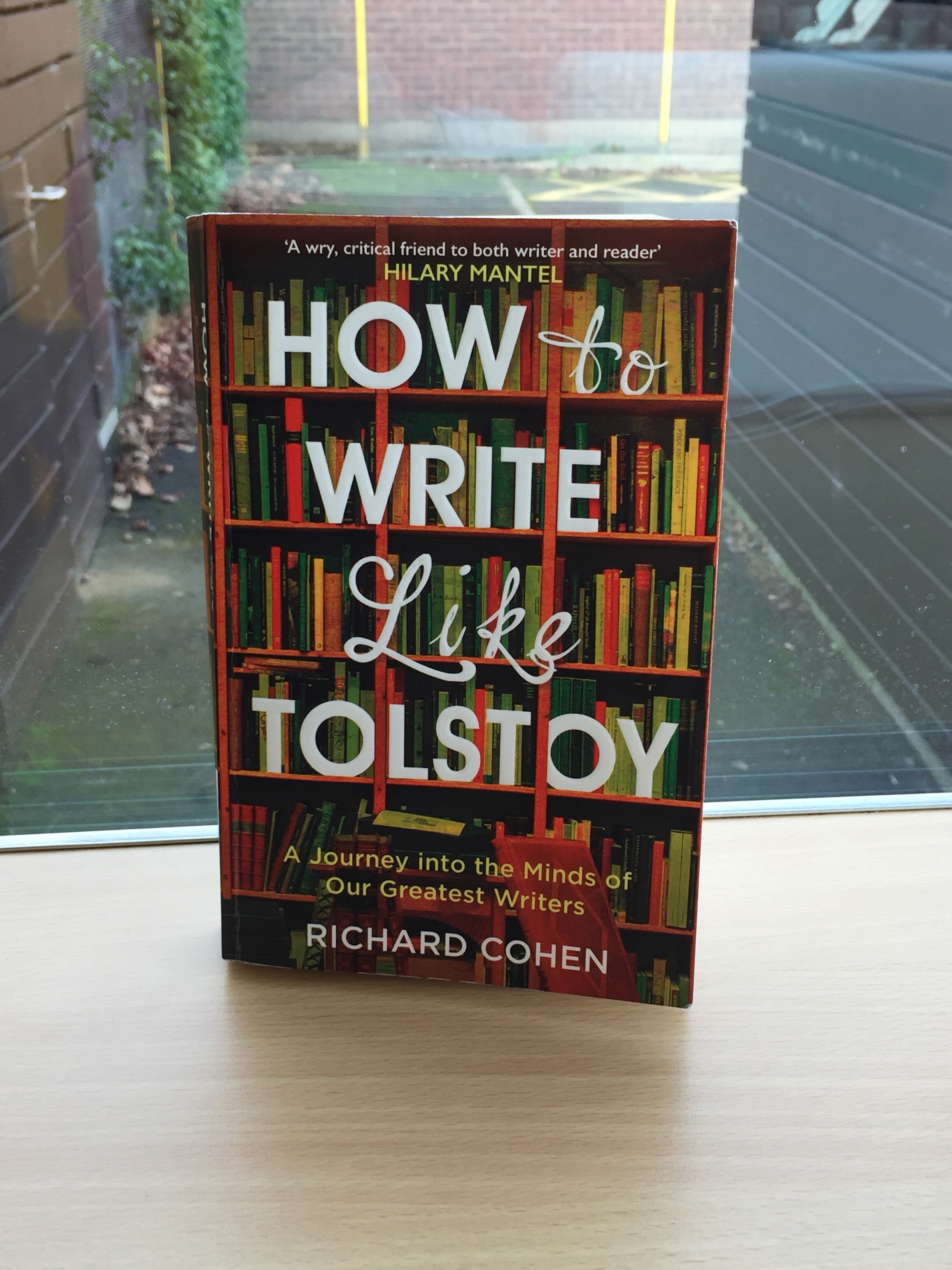
Somerset Maugham famously said that there are three rules for writing a novel. Unfortunately, no one knows what they are.
How to Write Like Tolstoy by Richard Cohen
should be read with caution. It is, like all other writing books, a How To book that is a How Not To, which means it shows and not tells you via anecdotes and countless examples of great literature, broken down into a structured and systematic analysis what is essentially the magical and unknown journeys we take when we read and when we write. It is a tour de force of all your favourite books in one and why they are. The content page alone is proof that editor and author Richard Cohen has attempted to turn the business of creative writing into practical advice.
Reading about the writing business is an illness that you already know too well, like flu or cold symptoms. For me, it is also a secret and guilty passion because in my heart, I know that you will never know what a great book is until it is a great book so how can this magic, this art be unravelled?
Beginnings
You recognise the symptoms of the infection straightaway. When you start reading a book about writing, they all tell you the same thing, and that is, all books begin in the same way:
“the opening paragraph, the whole question of starting off right. Thereafter the chapters are roughly organized according to the creative process. How characters are created seems paramount – most often, a character will stay with us long after the particular story has faded away – but how does one give them life? What names does one bestow, how much of a back story should be included?”
Can you teach creative writing?
The question is raised in the preface. Hanif Kureishi in the Guardian on 4 March 2014 famously said you can’t. “Creative writing courses are a waste of time,” he said.
“A lot of them [students] don’t really understand,” said Kureishi. “It’s the story that really helps you. They worry about the writing and the prose and you think: ‘Fuck the prose, no one’s going to read your book for the writing, all they want to do is find out what happens in the story next.’ “
He also says that 99.9% of his students are not talented and the little bit who are left are. If skill comes with talent, then the skill can be taught and improved but the original talent still has to be present. That is why when all else fails, writing is referred to as a craft, akin to knitting a jumper or wood-whittling. If it is crude and wrongly-made, that’s just tough. You have to make it again and again until proportionally, structurally and aesthetically it is just right. There is no magic in it.
The short-lived Brendan Behan (1923-64) described himself as a “drinker with a writing problem”.
“He was invited by a prestigious American university to deliver an afternoon lecture about his craft. Behan’s reputation as boozer and rabble-rouser meant that the lecture hall was filled to capacity with students standing at the back and perched in the aisles, but the appointed hour came and went, with still no sign of the great man. Time laboured on; the stage remained empty. After forty-five minutes or so, a more than usually dishevelled Behan stumbled in, and the audience waited, in equal parts expectant, curious and alarmed. “Good afternoon,” he crooned. “Now hands up all of you who want to be writers.” Nearly everyone raised an arm. Behan viewed this forest with disgust. “Well, then,” said he. “Go on back home and frickin’ write.” With that, he reeled off the stage.”
Kurt Vonnegut who for many years was on the faculty of the prestigious Iowa Writers’ Workshop, also believed that one could not make writers. He said he himself was like a golf pro who could at best “take a few shots off someone’s game”.
Hemingway said what must be a classic truism by now: the only way for a writer to learn his craft was to go away and write. Despite hours of tutorials from Gertrude Stein, Hemingway had to write to her: “Isn’t writing a hard job though? It used to be easy before I met you. I certainly was bad. Gosh, I’m awfully bad now but it’s a different kind of bad.”
This different kind of bad confirms that the teaching of the craft only highlights how difficult it is to stand out or be original. Once you become a writer aware, you become writer beware. Although teaching writing and publishing is a big business now, with creative writing Masters programme costing thousands of dollars or pounds of fees, it always comes down to: but Dickens didn’t do an MA, neither did Hemingway, Atwood, Orwell, nor J K Rowling. In reality, no one did because it was only recently (in the last 20 years) that creative writing courses came to exist. There was no such thing before. Either you were a writer or you weren’t.
My MA in Writing at Middlesex University
From a personal viewpoint, I became a “professional” when I did my MA in Writing at Middlesex University. I was already a writer. Doing the course did not make me a writer (I had been writing since I could write i.e. from the age of 8 or 9). But it turned my writing from a noun into a verb. Before there was such a thing as MA in Writing, I attended a writing group, the City Lit Writers’ Club in the late 1990s. Being “taught” creative writing was the best thing that ever happened to me as a writer. I am a very small person physically and socially, so I feel I need to be part of a big organisation. It gave me confidence that more than one person (i.e. myself) liked my work. I know that writing is like fine arts, a self-taught interest/hobby/profession/career but I still believe that I need to be self-taught in a group. Most recently, I attended the London Lit Lab’s weekend workshop (a story in a weekend). I am still working on that same story now, editing and perfecting it. However, I would not have written 3000 words in a day had not been for the workshop where I was being “taught” to start writing from scratch after a long period of not writing.
Any university course aims to give you skills or to improve your skills, even more so a Writing MA. Cry of the Flying Rhino was born at Middlesex. Yes! It’s actually a North Londoner! Without having attended the MA at Middlesex, I could not have written the book I wanted to write, nor been granted the opportunity to say what I wanted to say, free of constraints, fear, guilt, grammar, market desirability and proverbial voices over the shoulder, free of boundaries of race, language, culture. A book that experimented with patois, multiple voices, a book that is pure literature. A book that ultimately, after 12 years of dormancy on my hard drive, was submitted for an international literary prize and won. Now that I have written two books and am writing my third, I would not hesitate to say that I was “taught” something: that an MA in Writing is the most freedom you will ever get as a writer.
What about George Orwell?
What about him? He is one of my literary heroes. Perhaps what I liked about his honesty and his writing was what he “taught” me, which is not to aim for popularity but to say what you want to say but make it clear:
“Perhaps one did not want to be loved so much as to be understood.”
He began his career as a clumsy writer. At the age of 24 he moved into cheap lodgings in London, and was befriended by the distinguished poet Ruth Pitter. The two would go for long walks along the Embankment discussing his stories, or meet for dinner of a bottle of red plonk when she would give him unsparing criticism and therefore taught him to compose those stories even though the original gift for storytelling was in fact his own.
Plot
is formula, a template. The titular Leo Tolstoy once said all great literature is one of two stories. A man goes on a journey or a stranger comes to town.
Naturally this is sexist and I shall avert my eyes. Man is generic. It could be a child or woman or a living thing. Sexism aside, it is not so simple. If it were, then there would not be so many narratives available.
Carlo Gozzi, an Italian playwright of the 18th century said there were 36 plots. 2004’s bestselling Seven Basic Plots won approval of many writers. Oxford philosopher Roger Scruton called it “a brilliant summary of storytelling.”
Overcoming Monster
Rags to Riches
The Quest
Voyage and Return
Comedy
Tragedy
Rebirth
These are just nonsensical hashtags in my view. If there are only 7 then how come all the greatest books have all of the above?
Sex
Naturally I turned to this chapter first being someone who can’t, won’t and doesn’t write about sex. As it happens this is a very interesting chapter. It is not about erotica or pornography. “It’s nearly always best to avoid detailed descriptions or elaborate imagery” which is how one turns the writing about sex into erotica or pornography.
William F Buckley liked to recall a dinner with Vladimir Nabokov who told him that he was smiling because he polished off his OSS in that afternoon’s writing session.
What’s an OSS? asked Buckley.
Nabokov explained. Obligatory sex scene.
A depressing scenario is when writers put in a sex scene, badly-written because they hope it will boost sales, or win them popularity or whatever. Bibliotheque Nationale in Paris has a section for erotica and it is aptly called L’Enfer. Hell.
Shirley Conran, bonkbuster bestseller, subcontracts her erotic scenes to Celia Brayfield. Detachment from the characters is still a great way to get attached to them. The irony. Summary about writing about sex?
Writing about sex is a fine ambition but difficult to carry off successfully. Try, but be ready to junk the pages.
The Song of Songs, a long erotic poem, in the Old Testament has been described as the single most instructive example of how to write effectively about physical love. The second most successful love scene is John Donne’s “To His Mistress Going to Bed”:
Now off with those shoes: and then safely tread
In this love’s hallow’d temple, this soft bed…
By this these Angles from an evil sprite,
Those set out hairs, but these our flesh upright.
Licence my roving hands, and let them go
Before, behind, between, above, below.
O, my America! My new-found-land,
My kingdom, safeliest when with one man mann’d…
To enter in these bonds, is to be free;
Then where my hand is set, my seal shall be.
Full nakedness! All joys are due to thee.
The advice in a nutshell is to use poetic licence. Language is still language. Do not describe body parts. Less is more. End of scene.
Endings
There is no need to recap or to sum up with a great statement of “wearisome” arguments already made. “When you have said what you want to say,
Stop.”
Thanks for reading this blog post! If you like South-east Asian and vintage arts and cultures, you will love my award-winning novel Cry of the Flying Rhino set in Malaysia and Borneo in the 1990s. It is dark, macabre and thrilling, it has received a handful of five-star reviews already. And of course, it is stylish like you and I.
- Paperback US Amazon
- Paperback UK Amazon
- Kindle eBook US
- Kindle eBook
- Amazon author’s page
- Goodreads author’s page
